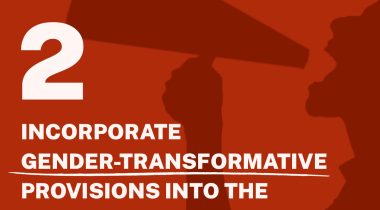
Global Alliance for Tax Justice ■ Why is tax justice an integral part of the struggle for women’s rights?

We’re pleased to share this blog, originally posted by Global Alliance for Tax Justice (GATJ) as part of the 7th edition of the Global Days of Action on Tax Justice for Women’s Rights.
As the world commemorates this International Women’s Day, the Global Alliance for Tax Justice (GATJ) stands in solidarity with women’s rights organisations, movements, academics and activists, bringing the perspectives and contributions of the economic justice movement to advance the gender justice agenda. We are at a critical point in which a dangerous combination of fiscal policy and political choices continues to benefit a small yet exceedingly influential elite, increasing inequalities. Across the world, it is women who disproportionately bear the brunt of these fiscal policy failures through several layers of injustice.
In this scenario, GATJ invited eight women, who are members and allies of its Tax and Gender Working Group (TGWG), to reflect on the importance to call attention to the tax justice agenda as we commemorate the IWD, and how the demands for tax justice relate to women’s historical and present struggles for rights.
Read below their answers.
Leah Eryenyu, from the Tax Justice Network Africa

“Fiscal policy is shaped by the fallacy that revenue generated from monetized productive work within the market economy is mutually exclusive from women’s unpaid social reproductive work performed in the domestic sphere. And yet without the latter, the revenue from paid work with which macroeconomic policy preoccupies itself would suffer. This structuring of socio-economic relations has been a source of deep inequalities, such as limited economic opportunities for women, wage disparities, the devaluation of feminised labour, and women’s depletion. Organising around tax justice attempts to redress these inequalities by demanding a recognition of women’s indispensable labour. Recognition in this case not merely being the celebration of this unrewarded toil, but the actual rejection of the logics that construct social reproduction as women-only work, followed by appropriation of tax resources towards easing this burden.”
Wangari Kinoti, from Action Aid International

“International Women’s Day has its roots in women organising around labour. Women’s labour is inextricably linked to tax. When austerity and other failed measures defund and collapse public services, it is women who pay through increased unpaid care work, more precarious paid work and through out of pocket payments for privatised services. When you combine this with regressive tax measures such as high consumption taxes, it places extreme pressures on households. Tax raised and spent progressively can fund public services which are necessary to redistribute care, create decent jobs in the public sector and deliver on women’s rights. On this day, we need to amplify feminist calls for economies centred on care, and tax is a critical component.“
Faith Lumonya, from Akina Mama Wa Afrika

“Financing a country is a collective effort. Countries majorly finance their development through tax. This is why tax is an important tool for development. However, we operate within an unfair tax system in which those with the highest ability to pay do not pay their share, while those with the least ability to pay, pay over and above their ability. This is why as feminists, we demand a system change.
I have heard the world’s billionaires call on governments to tax them. For me, it feels like, particularly for governments in the global South, that they are being called to beard the lion in his den. Billionaires control the system. Through the global financial architecture they have determined whether they will pay their share of taxes or not; and when they choose to pay, how much they will pay. Thus, their call is only a mockery. If they had the willingness to pay, they would not need to ask to be taxed, they should pay! This is what tax justice is about.
African women have, because of systems such as colonialism, patriarchy, and imperialism historically been disadvantaged when it comes to access and control of productive resources. As such they have been marginalised within the economic and political field, and yet fiscal policies that govern revenue collection and distribution are influenced by and often favour powerful individuals and large companies, many of which are male, or male-owned respectively. To ensure tax justice, policy makers must be aware of how oppressive systems and policies can work against certain less privileged individuals and act as a barrier to their enjoyment of certain opportunities. Such differences include gender, socio-economic class (whether one is rich or poor), age, ethnicity, race, among others.”
Sophie Efange, from the Gender and Development Network

The fight for tax justice is integral to the ongoing battles for women’s rights worldwide. Throughout history, women have faced various forms of exclusion from public life, including within decision-making processes related to the design and implementation of tax policies. This has contributed to women’s limited access to economic resources and created gender biases across tax systems that continue to ignore women’s lived experiences. Calls for tax justice aim to challenge these exclusions by advocating for equitable and transparent tax policies that benefit all members of society, including all women. Such policies have the potential to address the range of socio-economic and political barriers that women face and help to adequately resource gender-transformative public services and social protection programmes. Conversely, regressive tax policies can perpetuate gender inequalities and further undermine women’s rights. Therefore, demands for tax justice remain a critical site of struggle for women’s rights, connected to the need for equitable tax systems that eliminate both historical and ongoing barriers faced by women.
Liz Nelson, from the Tax Justice Network

The subjugation of women is centuries old. The resulting inequalities have had, and continue to have, a profound impact on women and girls economically, socially and culturally. These persist today, in the fiscal and tax regimes and extractive economies and cultures that operate in high and low per capita countries. Not surprisingly, the burden and damage is disproportionately felt by women and girls in low income countries and in the households where regression and policy incoherence of unjust tax policies continue to marginalise by gender, race, disability and people of indigenous communities. The story of overlapping gender injustice must, then, turn its focus laser-like on the financial opacity and tax injustice that operates largely unfettered. Long awaited, much needed, is an intergovernmental agreement to ‘re-code’ international financial laws and tax policies to mobilise national revenue, redistribute revenue, and to use tax to incentivise or disincentivize public ‘bads’ , and establish greater representation between women and the state. The transparency, disclosure and enforcement needed to mitigate gender inequality depends on well-resourced institutions, and in turn such sustainable revenue requires ‘good’ taxes that target wealth. Both require a shift to inclusive and transparent governance of tax sovereignty.
Roos Saalbrink, from Action Aid International

“Women’s struggles for the right to the vote, equal pay, economic rights and bodily autonomy are historic, yet still very pertinent, as shown by the recent regression of hard-won women’s rights and gender equality since the start of the COVID-pandemic. For all women’s struggles how resources are used and who has the power to decide is critical. Women carry a disproportionate burden of unpaid care and domestic work, doing 76% of it worldwide. When public services are not available, inadequate or understaffed, this affects women most as shock absorbers of austerity and crisis; as we are most likely to pick up the gaps in care, lose the chance to decent work and have services cut that are relevant to us, such as maternal health or reproductive health rights. Tax systems and policies are at the heart of what resources are available for gender-responsive public services, but also shapes how resources are collected, used and (re)distributed – or as in the current system accumulated in the hands of a few. For all women to exercise choice and control over economic opportunities, outcomes and resources, and shape economic decision-making at all levels tax justice is key.”
Riska Koopman, from the Global Alliance for Tax Justice

“Women continue to be disproportionately negatively impacted by tax injustice, more so in the global South. Due to gendered norms in a patriarchal capitalist society, women shoulder much of the unseen work which capitalism cannot operate or thrive without. Despite this, they are still on the receiving end of increased austerity measures which impede their access to basic essential services such as health care and education. Women, historically, are the shock absorbers to the failed extractivist capital system, where tax injustice occurs women’s unpaid care work increases, the failures of the economic system, particularly a failure to implement progressive tax systems means the continuation of the externalisation of the gaps onto women’s work in the home and community. The demand for tax justice remains historically rooted in the demand for women’s rights.”
Meghna Abraham, from the Center for Economic and Social Rights

“The fight for women’s rights has always been closely linked to access to and control over economic resources. Historically, women were denied the right to vote because of their socioeconomic class and race. In the last thirty years, we know that the burden caused by the weakening of the fiscal state has been borne by women from lower income groups. How tax is raised and spent determines whether women fill the gaps in public services through unpaid or low paid care work and who accumulates wealth in a society. Higher rates of indirect taxes in countries or lack of funding for public services because of tax systems being poorly conceived or implemented have disproportionate impacts on women. Tax policies can also disincentivize women’s work and, along with a lack of adequate labour laws, force women into informal and precarious employment. Demands for tax justice must be based on and support the struggles for all women to realise their rights and achieve gender and racial equality.”
Global Days of Action on Tax Justice for Women’s Rights 2023
GATJ, its regional networks and partner organisations will hold, from 6 to 17 March, the 7th edition of the Global Days of Action on Tax Justice for Women’s Rights. The campaign coincides with the 67th session of the United Nations Commission on the Status of Women (UN CSW67), which is a key strategic advocacy opportunity and space to engage with policy-makers on tax justice issues affecting women.
This year, the campaign focuses on the call for the urgent adoption of wealth taxes to advance towards the realisation of women’s rights, gender equality, and the empowerment of women and girls. Throughout the two weeks of the campaign, there will be several virtual, in-person and hybrid events and activities across the world, calling on governments and multilateral institutions to make taxes work for women.
Related articles
The elephant in the room of business & human rights
UN submission: Tax justice and the financing of children’s right to education
14 July 2025
One-page policy briefs: ABC policy reforms and human rights in the UN tax convention
Tax justice pays dividends – fair corporate taxation grows jobs, shrinks inequality
UN Submission: A Roadmap for Eradicating Poverty Beyond Growth
A human rights economy: what it is and why we need it

Do it like a tax haven: deny 24,000 children an education to send 2 to school

Incorporate Gender-Transformative Provisions into the UN Tax Convention
Just Transition and Human Rights: Response to the call for input by the Office of the UN High Commissioner for Human Rights
13 January 2025


